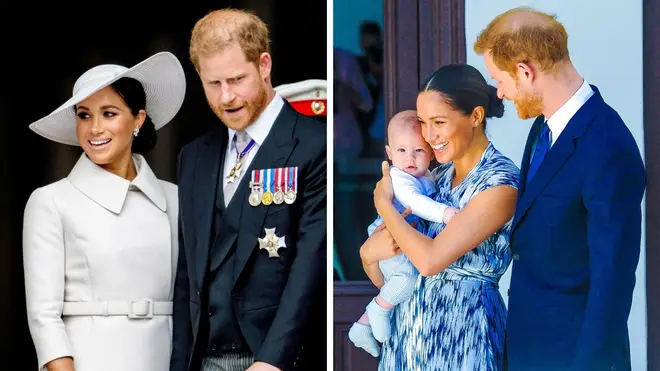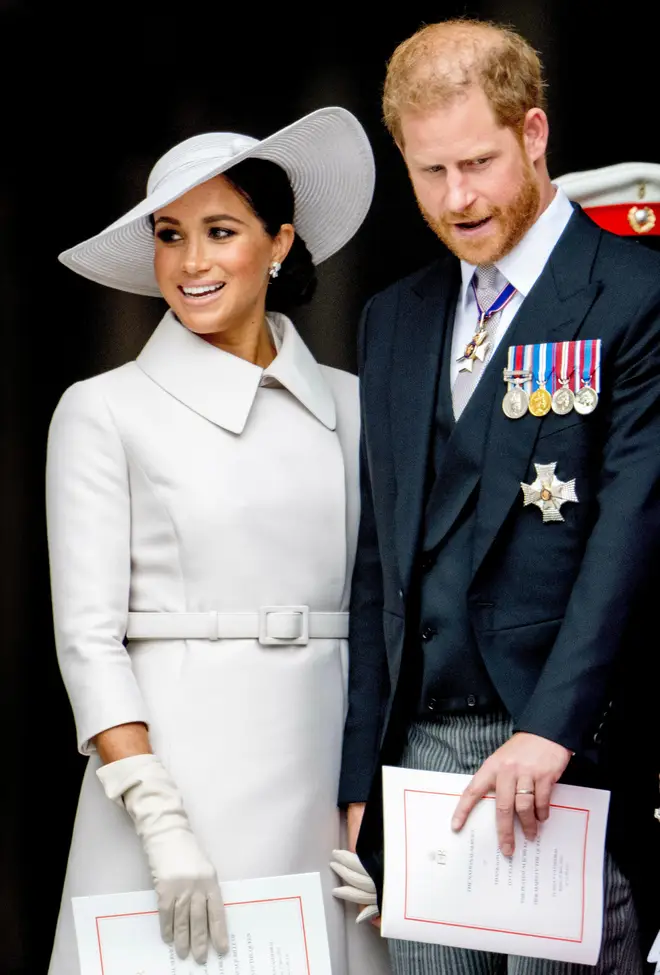
Shelagh Fogarty 1pm - 4pm
7 July 2022, 15:25

Prince Harry was not told that the Queen's aides were involved in a decision to cut his security arrangements when in the UK, the High Court has been told.
The Duke of Sussex is bringing legal action over a decision not to allow him to pay for police protection for himself and his family while in the UK.
Harry, 37, wants to bring Meghan Markle and his children Archie and Lilibet to visit from their home in the US but he and his family who now live in Montecito, California, are "unable to return to his home" because it is too dangerous, a representative previously said.

Read More: William 'mourns' collapse of relationship with Harry as brothers reach 'rock bottom'
Read More: Prince Harry and Meghan Markle arrive in UK for Platinum Jubilee
Harry's lawyers are asking Mr Justice Swift at a hearing in London on Thursday to grant permission for a full judicial review of the Home Office's decision.
He is challenging the February 2020 decision of the Executive Committee for the Protection of Royalty and Public Figures (Ravec) - which falls under the remit of the Home Office - over his security, after being told he would no longer be given the "same degree" of personal protective security when visiting.
The duke's legal team are seeking to argue that the security arrangements set out in a letter from Ravec, and their application when he visited the UK in June 2021, were invalid due to "procedural unfairness" because he was not given an opportunity to make "informed representations beforehand".
Shaeed Fatima QC, for the duke, told the court: "He didn't know at that stage that the Royal Household was involved at all ... he was told it was an independent decision."
She also said there were "significant tensions" between Harry and the Queen's private secretary, Sir Edward Young, at that time.
In written arguments, Ms Fatima said Harry was not given a "clear and full explanation" of the composition of Ravec and those involved in its decision-making - for example, that it included the Royal Household.
She also said his understanding was that his points regarding security, which he passed on to the Royal Household, were being "fully and properly communicated to Ravec".
Ms Fatima said he was denied the opportunity to make representations directly to Ravec and was "materially prejudiced" because "among other things, his offer to pay (for security) was not conveyed to Ravec before the decision was made".
She added: "He does not know what else - as communicated by him to the Royal Household - was not fully/timeously conveyed to Ravec.
"He was deprived of the opportunity to comment on the appropriateness of Ravec's process (and) the involvement of certain individuals in the Ravec process prior to the decision being made.
"It is arguable that, if there had been a fair process, Ravec would or could have reached a different decision."
Lawyers for the Home Office say Ravec was entitled to reach the decision it did, which is that the duke's security arrangements will be considered on a "case by case" basis, and argue that permission for a full judicial review should be refused.
Sir James Eadie QC, representing the Home Office, said in written arguments that any tensions between Harry and Royal Household officials are "irrelevant" to his change in status.
He said: "In his skeleton, the claimant now refers to objections he might have made to any role being played by officials of the Royal Household in Ravec's decision-making - apparently because of personal tensions he felt with them.
"But there is no bias challenge and any such tensions are irrelevant to the undisputed fact of the claimant's change in status which led to the decision of Ravec.
"The inability of the claimant even now to explain how a process of representations could or would have assisted is striking."
Sir James also said there is "no basis for the court to conclude that it would be anything other than highly likely" that allowing Harry to make representations to Ravec before the decision was made "would not have led to that decision being substantially different, or even at all different".
The judge ruled in March that parts of the court documents in the case should be remain private.
Ms Fatima previously told the court that Harry considers the UK "is and always will be his home".
A representative for Harry previously said the duke wants to fund the security himself, rather than ask taxpayers to foot the bill.
However, Robert Palmer QC, for the Home Office, previously told the court that the duke's offer of private funding was "irrelevant".
In written submissions, he said: "Personal protective security by the police is not available on a privately financed basis, and Ravec does not make decisions on the provision of such security on the basis that any financial contribution could be sought or obtained to pay for it."
Mr Justice Swift said he will give his decision in writing at a later date on whether to grant permission for a full hearing.